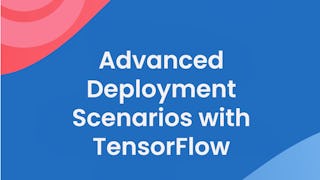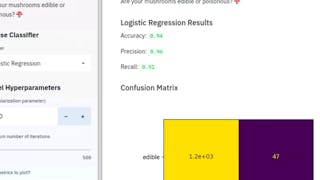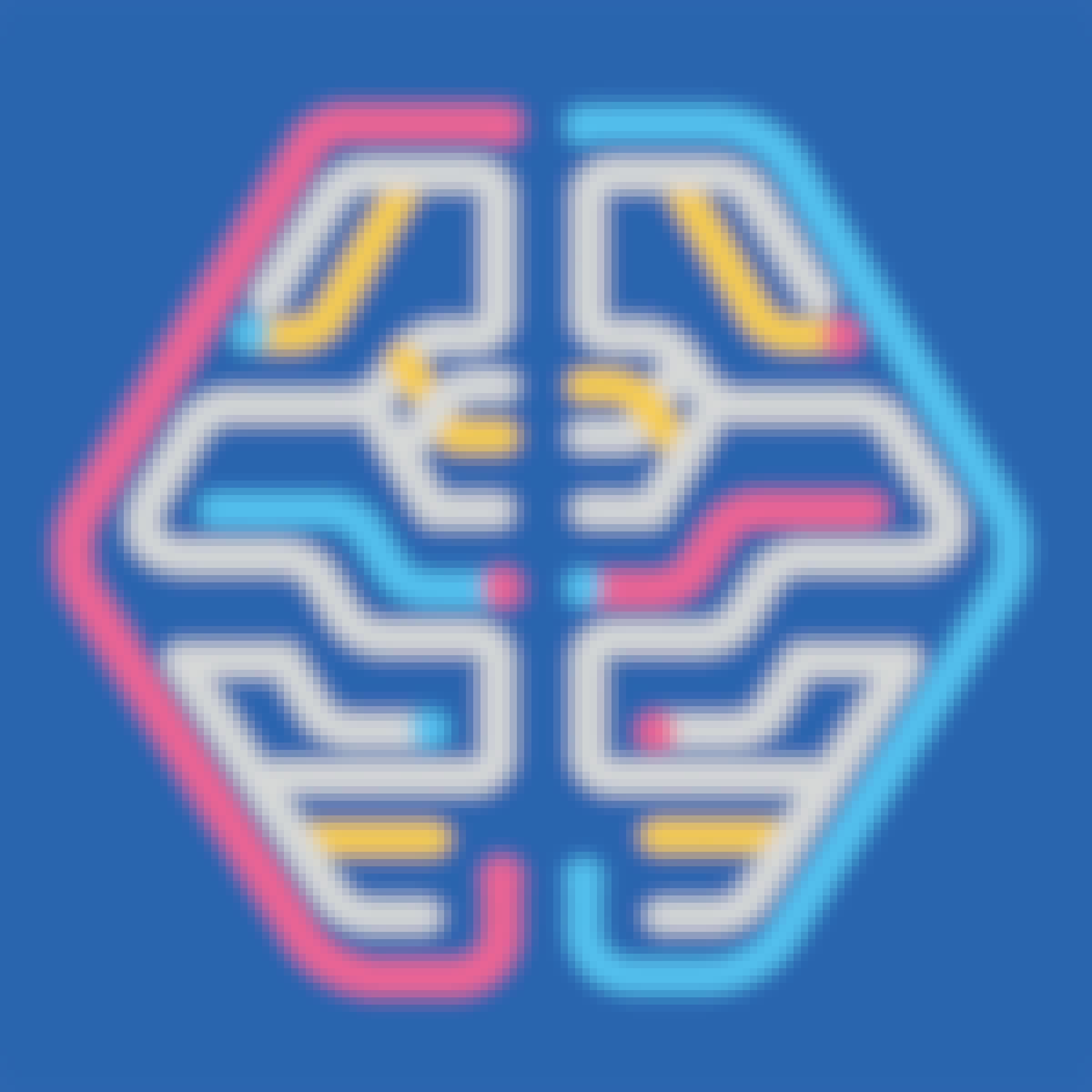- Browse
- Deep Learning
Deep Learning Courses
Deep learning courses can help you learn neural networks, convolutional networks, and recurrent networks, along with their applications in image recognition and natural language processing. You can build skills in model training, hyperparameter tuning, and performance evaluation, which are crucial for developing effective AI solutions. Many courses introduce tools like TensorFlow and PyTorch, allowing you to implement algorithms and optimize models, making your learning experience hands-on and relevant to current industry practices.
Popular Deep Learning Courses and Certifications
 Status: Free TrialFree TrialD
Status: Free TrialFree TrialDDeepLearning.AI
Skills you'll gain: Model Deployment, Extract, Transform, Load, Federated Learning, Data Pipelines, Image Analysis, Data Import/Export, Tensorflow, Transfer Learning, Convolutional Neural Networks, iOS Development, Android Development, Data Preprocessing, Data Processing, Computer Vision, Swift Programming, MLOps (Machine Learning Operations), Model Evaluation, Mobile Development, Javascript, Machine Learning
4.7·Rating, 4.7 out of 5 stars1.5K reviewsIntermediate · Specialization · 3 - 6 Months
 Status: FreeFreeG
Status: FreeFreeGGeorgia Institute of Technology
Skills you'll gain: English Language, Language Competency, Oral Comprehension, Language Learning
4.6·Rating, 4.6 out of 5 stars446 reviewsMixed · Course · 1 - 4 Weeks
 Status: Free TrialFree TrialD
Status: Free TrialFree TrialDDeepLearning.AI
Skills you'll gain: Model Deployment, Federated Learning, Tensorflow, Transfer Learning, Model Evaluation, Machine Learning, Information Privacy, Application Programming Interface (API), Artificial Neural Networks, Data Visualization
4.8·Rating, 4.8 out of 5 stars510 reviewsIntermediate · Course · 1 - 4 Weeks
 L
LLearnQuest
Skills you'll gain: Artificial Intelligence and Machine Learning (AI/ML), Model Deployment, Microsoft Azure, Python Programming, Machine Learning, Machine Learning Algorithms, Data Science, Image Analysis, Computer Vision, Natural Language Processing, Application Programming Interface (API)
4.4·Rating, 4.4 out of 5 stars978 reviewsAdvanced · Course · 1 - 3 Months

Skills you'll gain: Machine Learning Algorithms, Data Visualization, Dashboard, Classification Algorithms, Interactive Data Visualization, Data Visualization Software, Model Evaluation, Machine Learning, Scikit Learn (Machine Learning Library), Plot (Graphics), Web Applications, Logistic Regression, Predictive Modeling, Data Science, Python Programming, Pandas (Python Package)
4.7·Rating, 4.7 out of 5 stars416 reviewsIntermediate · Guided Project · Less Than 2 Hours
 Status: NewNewStatus: Free TrialFree Trial
Status: NewNewStatus: Free TrialFree TrialSkills you'll gain: AI Security, Application Security, Secure Coding, DevSecOps, Open Web Application Security Project (OWASP), Responsible AI, Threat Modeling, Vulnerability Scanning, AI Personalization, Continuous Integration, Code Review, PyTorch (Machine Learning Library), MLOps (Machine Learning Operations), Dependency Analysis, Analysis, Program Implementation, Supply Chain
Intermediate · Course · 1 - 4 Weeks
 Status: PreviewPreviewU
Status: PreviewPreviewUUniversity of Illinois Urbana-Champaign
Skills you'll gain: Education Software and Technology, Learning Theory, Instructional Design, Learning Management Systems, Digital pedagogy, Technology Solutions, Disabilities, Human Computer Interaction, Emerging Technologies, Electronic Media, Gerontology
4.5·Rating, 4.5 out of 5 stars192 reviewsMixed · Course · 1 - 3 Months
 Status: Free TrialFree TrialStatus: AI skillsAI skills
Status: Free TrialFree TrialStatus: AI skillsAI skillsSkills you'll gain: Prompt Engineering, Prompt Patterns, AI Product Strategy, Generative AI, New Product Development, Product Management, Product Lifecycle Management, Generative Model Architectures, Product Development, Innovation, ChatGPT, Product Roadmaps, Usability Testing, Product Planning, Responsible AI, Commercialization, Generative Adversarial Networks (GANs), Artificial Intelligence, Product Strategy, Project Management Life Cycle
4.7·Rating, 4.7 out of 5 stars34K reviewsBeginner · Professional Certificate · 3 - 6 Months
 Status: NewNewStatus: Free TrialFree Trial
Status: NewNewStatus: Free TrialFree TrialSkills you'll gain: Anomaly Detection, MLOps (Machine Learning Operations), Event Monitoring, Continuous Monitoring, System Monitoring, Unsupervised Learning, Threat Detection, Statistical Analysis, Exploratory Data Analysis, Trend Analysis, Real Time Data, Statistical Methods, Performance Tuning, Time Series Analysis and Forecasting
Intermediate · Course · 1 - 4 Weeks
 Status: Free TrialFree TrialU
Status: Free TrialFree TrialUUniversity of California, Irvine
Skills you'll gain: Video Production, Grammar, Peer Review, Writing, Editing, Proofreading, English Language, Language Competency, Vocabulary, Language Learning, Creativity
4.8·Rating, 4.8 out of 5 stars2.6K reviewsAdvanced · Specialization · 3 - 6 Months
 Status: PreviewPreviewT
Status: PreviewPreviewTThe State University of New York
Skills you'll gain: Lifelong Learning, Growth Mindedness, digital literacy, Willingness To Learn, Critical Thinking, Emerging Technologies, Professional Development, Data Ethics, Computer Literacy, Safety and Security, Creativity, Technology Strategies, Problem Solving, Web Content Accessibility Guidelines, Collaboration, Communication
4.3·Rating, 4.3 out of 5 stars443 reviewsBeginner · Course · 1 - 3 Months
 Status: Free TrialFree Trial
Status: Free TrialFree TrialSkills you'll gain: Model Deployment, Tensorflow, Keras (Neural Network Library), Cloud Deployment, Google Cloud Platform, Data Pipelines, MLOps (Machine Learning Operations), Deep Learning, Data Preprocessing, Model Evaluation, Artificial Neural Networks, Feature Engineering, Machine Learning, Python Programming, Data Transformation
4.4·Rating, 4.4 out of 5 stars2.8K reviewsIntermediate · Course · 1 - 3 Months
Searches related to deep learning
In summary, here are 10 of our most popular deep learning courses
- TensorFlow: Data and Deployment: DeepLearning.AI
- Lesson | Express Yourself: Pronunciation: Georgia Institute of Technology
- Advanced Deployment Scenarios with TensorFlow: DeepLearning.AI
- Developing AI Applications on Azure: LearnQuest
- Build a Machine Learning Web App with Streamlit and Python: Coursera
- Secure AI Code & Libraries with Static Analysis: Coursera
- Learning Technologies Foundations and Applications: University of Illinois Urbana-Champaign
- IBM AI Product Manager: IBM
- Detect AI Anomalies: Real-Time Outliers: Coursera
- Learn English: Advanced Grammar and Punctuation: University of California, Irvine










